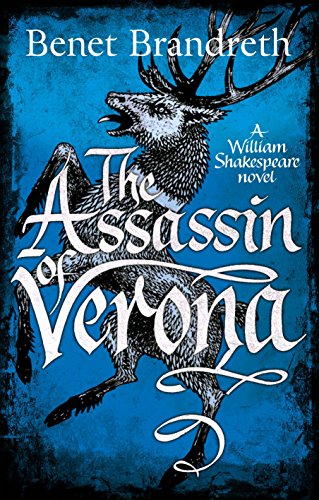The Assassin of Verona
Venice. Three players, Oldcastle, Hemminges and young William Shakespeare, disguised as the English ambassador and his servants, have discovered a Papal plot against Elizabeth I. To deliver the names of the Catholic spies to London, they must escape Venice, with the Pope’s agents in hot pursuit. Leaving William behind, Oldcastle and Hemminges reach Verona. In Duke Leonardo’s court, his headstrong daughter Aemilia, in love with her cousin, is refusing to cooperate with the Duke’s plans for a more suitable marriage. When the lovers flee to the forest, Hemminges, now also in love with Aemilia, goes along as protection. But there are many dangers: the Pope’s man is on the Englishmen’s trail and outlaws roam the woods. And where is Shakespeare?
Everyone ends up with the outlaws in the forest as the inventive plot gallops along. Echoes of the plays are enriched with recognisable characters: Aemilia as Rosalind, Oldcastle as Falstaff. The interplay between the characters causes each to react and respond, grow or fade in surprising yet convincing ways. When William turns up to take subtle control of the increasing chaos, we witness the birth of an artist ruthlessly manipulating people and situations, while always observing in the background. Brandreth’s Shakespeare is neither admirable nor likeable, but undoubtedly a genius in embryo.
The glory of the novel is in the gorgeous dialogue, expertly weaving Shakespeare’s lines with period vocabulary and syntax while keeping it completely comprehensible to the modern reader. Brandreth acknowledges the difficulties of responding to 16th-century language in 2018, yet brilliantly makes it live for us. A wonderful novel: enjoyable characters, exciting, funny, startling and ultimately, thought-provoking. Highly recommended.










